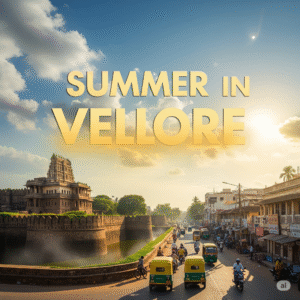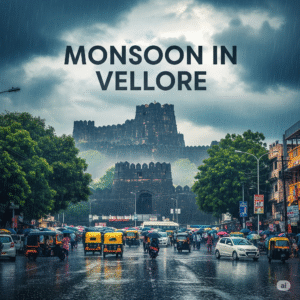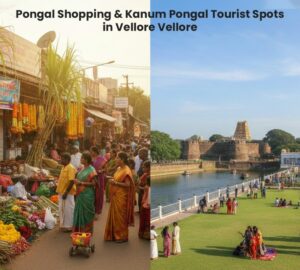
Explore Vellore Climate.
Introduction
Vellore, often called the “Fort City of Tamil Nadu,” is a beautiful destination known for its rich history, educational institutions, and vibrant culture. But before planning a trip, one important thing to know is the Vellore Climate. Since weather impacts travel comfort, sightseeing, and lifestyle, understanding the climate helps you plan better.
Understanding Vellore Seasonal Climate
Vellore experiences a tropical climate with hot summers, seasonal rains, and mild winters. The city is located in northern Tamil Nadu, near the Eastern Ghats, which influences its weather patterns. The Vellore Climate is typically warm throughout the year, with seasonal variations that make each period unique.
Seasonal Breakdown of Vellore Climate
Summer in Vellore (March – June)

- Temperature: 28°C – 43°C
- Summers in Vellore are hot and dry. Afternoons can get particularly harsh, so sightseeing during midday is not recommended.
- If you visit in summer, carry light cotton clothes, sunscreen, sunglasses, and always stay hydrated.
- Despite the heat, evenings are pleasant at times, making it suitable for short outings.
Monsoon in Vellore (July – September)

- Temperature: 25°C – 35°C
- Influenced by both southwest and northeast monsoons, Vellore Climate during this time brings moderate to heavy rainfall.
- Rain cools the city after the hot summer but can also cause waterlogging in some areas.
- It’s a refreshing season, ideal for enjoying green landscapes, but travelers should carry umbrellas and plan for occasional wet days.
Winter in Vellore (October – February)
- Temperature: 18°C – 28°C
- Winters are mild and comfortable, making it the best time to explore Vellore Climate.
- The cool weather is perfect for visiting attractions like Vellore Fort, Jalakandeswarar Temple, and Yelagiri Hills.
- Tourists, students, and locals look forward to this season because it’s pleasant without being too cold.
Impact of Vellore Climate on Lifestyle and Culture
The Vellore Climate has shaped how people live here:
- Agriculture: Monsoons are vital for farming, supporting crops like paddy and groundnut.
- Festivals: Traditional celebrations often align with seasonal changes—harvest festivals like Pongal are linked with winter and agriculture cycles.
- Food Habits: Light, cooling foods dominate summer diets, while winter brings heartier meals.
Best Time to Visit Vellore
The most comfortable time to visit is October to February, when Vellore Climate is mild and travel-friendly. Summers can be tiring due to the heat, while monsoons, though scenic, might disrupt travel plans.
If you want perfect weather for sightseeing, winter is the ideal season.
Tips for Adapting to Vellore Climate
- Summer: Wear cotton, carry water bottles, and avoid outdoor activities in the afternoon.
- Monsoon: Carry an umbrella or raincoat and wear quick-dry clothes.
- Winter: Light woolens are more than enough; mornings and nights may get slightly cooler.
Conclusion
The Vellore Climate is a blend of hot summers, refreshing monsoons, and pleasant winters. Each season offers its own charm, but winter is undoubtedly the best time for tourists. Whether you are visiting for history, education, or leisure, knowing the climate helps you enjoy your stay comfortably.
So, plan your trip with these insights and make the most of your time in this historic city
















